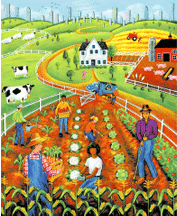News and Resources for CFSC Members
If you are part of a CFSC member organization and others in your group would like to receive this newsletter directly, send their names and email addresses to Rachel Smith.
You can read previous issues at the Grapevine Issue Archive.
Program News
Child Nutrition & Farm to School: A Winning Combination
For the past year, CFSC and our partners have been working diligently on the Child Nutrition Reauthorization, with a focus on winning inclusion of mandatory funding for Farm to School programs. This hard work has paid off in the Senate, where the Agriculture Committee’s base bill for child nutrition [PDF] included $40 million in mandatory funding for Farm to School programs, as well as significant improvements to program access, top quality diet products, and program integrity. This is a major milestone for the Farm to School movement!
The focus now shifts to the House Education and Labor Committee, which will likely take up the issue in the coming month. In the meantime, CFSC’s policy staff are working hard to gain additional support for H.R. 4710: The Farm to School Improvements Actintroduced by Rep. Rush Holt (D-NJ). We also are working with our colleagues to address concerns over proposed funding for the Senate bill—both to reach the full $1 billion per year investment in child nutrition programs proposed by President Obama, and to seek alternate funding sources for the bill.
For more information, visit our Policy Update Archives and sign up to receive bi-monthly policy updates.
For more on what Farm to School funding in Child Nutrition Reauthorization will be used for, visit the National Farm to School Network’s policy page.
Food Safety Project: Building on Farmers’ Input
As part of a new project to assist limited resource producers with meeting food safety and liability insurance requirements, CFSC and our partner organizations recently conducted 25 assessments with producers in four states. The results will help inform the development of materials and a training program for limited resource producers who are marketing to local institutions, which should be available this fall.
The assessment findings include the following:
- 76% of the producers had 20 acres or less in fruit or vegetables
- 64% indicated that at least one of their customers required product liability insurance
- 42% of the responses identified non-profit growers’ organizations as a source for guidance on food safety issues
- 93% identified a method they were using for managing manure or compost to prevent food safety problems
This project is funded by USDA’s Risk Management Agency (RMA). The organizational partners are Agriculture and Land-Based Training Association, Community Alliance with Family Farmers, Jubilee Project, Maine Organic Farming and Gardening Association, and the New Entry Sustainable Farming Project.
Contact: Kristen Markley
CFSC to Convene National TA Strategy Summit
The landscape for food system work is changing rapidly, with unprecedented interest and boundless opportunities. This is leading to expanding needs for training and technical assistance (T&TA), which are being addressed by a variety of organizations. CFSC is seeking to promote more information sharing and coordinationbetween these organizations, especially those providing T&TA at a national level. Late this summer, we will convene the first national strategy session for T&TA providers for community food projects.
At this groundbreaking meeting, participants will learn about each other’s work and niches, and think strategically together about emerging T&TA needs and opportunities. They also will examine how they can coordinate and collaborate to address emerging needs and build a stronger movement for a just and sustainable food system.
Invitations to this meeting went out in early April, and we plan to finalize the date and site soon. CFSC is grateful to the Community Food Projects (CFP) program for supporting this important event.
Contact: Kai Siedenburg
Committee Update
International Links
April 17th marked International Peasants’ Day, which was commemorated in communities throughout the world. To honor this important date, the International Links Committee devoted its April conference call to discussing the status of small-scale food producers, who are feeding their communities, preserving biodiversity, and cooling the planet, even as their livelihoods and very existence are threatened.
One key topic was the alarming trend of land grabbing, in which a country or corporation buys up food producing land in another country to meet foreign demands. La Via Campesina, FoodFirst Information and Action Network, and others have launched a campaign against land grabs, and they need our support.
Another focus was the need to pay fair and stable prices to those who grow and harvest our food. This was the theme of a demonstration at the Chicago Mercantile Exchange organized by Family Farm Defenders on April 16, as well as a Farmworker Freedom March in Florida organized by the Coalition of Immokalee Workersfrom April 16-18. For more on International Peasants’ Day, see La Via Campesina’s website. To get involved in the International Links Committee, email Co-chair Christina Schiavoni.
Related Link: CFSC committees
Upcoming Events
Taking Root: the 5th National Farm to Cafeteria Conference
Marriott Renaissance Center, Detroit, Michigan
May 17-19, 2010
Farm to Cafeteria is taking root all across North America, including in Detroit, where diverse groups are revitalizing their neighborhoods through local agriculture and gearing up to host an exciting national conference. The 5th National Farm to Cafeteria Conference will highlight innovative local programs in Detroit and around the country that are connecting kids with nearby farms and healthy food and creating a more just and equitable food system. It also will feature up-to-the minute news on federal programs and policies that are rapidly expanding the funding and support available for local Farm to Cafeteria efforts. CFSC is honored to have both Deputy Secretary of Agriculture Kathleen Merrigan and Detroit Mayor Dave Bing slated to present.
Youth leadership will be showcased through a Cooking Up Change healthy cooking contest, and by sharing the winners of the nationwide Real Food Is… video contest. Other conference highlights will include a community service project to build a school garden, field trips around the region, the Local Foods Reception at The Henry Ford, and the premiere of the film Lunch Line as a double feature with Grown in Detroit.
Learn more at www.farmtocafeteriaconference.org
Find conference presentations and resources at Slideshare.com/takingroot
Food, Culture & Justice: The Gumbo That Unites Us All
CFSC’s 14th Annual Conference
Sheraton New Orleans Hotel, New Orleans, Louisiana
October 16-19, 2010
New Orleans is a unique city, deserving of a unique conference. CFSC is reinventing our annual conference with a new format that emphasizes time for networking and exploring the region, as well as a strong focus on food justice and the innovative, multi-cultural organizing work taking place in New Orleans.
The conference will feature fabulous field trips to destinations throughout the Gulf Coast Region, insightful plenary sessions, and incredible food. Session topics will include rebuilding local food economies, ending poverty and increasing food access, outcomes of the US Social Forum, environmental justice, public health links, food policy councils, urban agriculture, and more.
To stay posted on conference announcements, join our conference email list, become a fan of CFSC on Facebook, or follow our conference Twitter feed.
Member Profiles
Toronto Food Policy Council
The Toronto Food Policy Council (TFPC) is a citizen body of food activists and experts responsible for generating food policy for the City of Toronto. Formed in 1991, the 30-member TFPC serves as a professional lobbyist for the people and supports scores of programs with the shared goal of ensuring equitable access to food, nutrition, community development, and environmental health. TFPC is free to make its own decisions on food policy issues, and the council’s staff are employed by the Toronto Department of Public Health. This arrangement has gained interest from diverse organizations around the world.
Recent TFPC accomplishments include hosting a large conference on Building Infrastructure for a Local Food System, launching North America’s first Youth Food Policy Council, and contributing to the development of the public health department’s comprehensive food strategy for Toronto. In 2009, TFPC received the Bob Hunter Environmental Achievement Award, an annual award given to a City of Toronto agency with a record of outstanding leadership.
Toronto Food Policy Council website
Gateway Greening
Gateway Greening promotes urban neighborhood vitality, healthy living, and quality of life through community food projects, education and wellness programs, and civic greening. They provide grants and support to over 200 community and school gardens across St. Louis, Missouri that grow fresh foods that are not readily available in many underserved neighborhoods. These gardens transform vacant or abandoned land into a resource for growing healthier families and stronger neighborhoods.
Their 2.5-acre City Seeds Urban Farm works with individuals who are seeking to overcome homelessness, beat drug addiction, and cope with mental illness. These urban farmers learn horticultural and life skills while growing fresh food that is sold at three farmers’ markets or donated to emergency food providers. Additionally, Gateway Greening’s GoGreen! program trains them in landscape maintenance and helps to place them in permanent jobs with the goal of increasing their self-sufficiency. The farm also hosts monthly cooking and food preservation classes.
Gateway Greening also partners with early childcare centers and in-home day care centers to create gardens for preschoolers. They provide teachers with garden-based curriculum training, nutrition education, and menu planning assistance.
Board Member Profile
James Johnson-Piett is Principal and CEO of Urbane Development, LLC, an economic and community development firm based in Philadelphia. James’ work focuses on providing healthy food access to underserved and distressed communities through the development of healthy food retail outlets. Urbane Development’s work encompasses a range of innovative solutions to food access issues, from the design and implementation of city-wide grocery attraction and financing programs to management of full scale corner store conversion projects. James has served on the CFSC Board since 2007 and as Board Treasurer for almost two years.
A jack-of-all-trades, James is part of the screenwriting collective The Writer’s Bloc, which creates both short and feature length scripts. These include James’ magnum opus, Ascendant, a dark comedy about a failed theoretical physicist who seeks redemption through the most unlikely of circumstances: proving the scientific validity of astrology. High jinks ensue.
Related link: CFSC board contact list
Staff Profile
Rachel Smith joined the CFSC team a year ago as Office Assistant. Her domain in the Portland office includes membership renewals, conference registrations, and publication orders. The opportunity to chat with members and staff across the country about their efforts in the food justice movement renews her energy and dedication to the cause, and is a great perk of the job!
She is a native and proud Portlander, grateful to call such a beautiful city home. Outside of her work at the Coalition she can be found picking slugs off seedlings in her community garden, or pounding the pavement as she runs around the Boring Lava Field that Portland lies on (there are seven volcanoes!) A student of sociology and social change, she actively pursues her belief that the greatest revolutions were inspired while digging in the dirt.
Related link: CFSC staff contact list




 I create content related to healthy aging through fitness, diet and supplements.
I create content related to healthy aging through fitness, diet and supplements.

